Colonialism
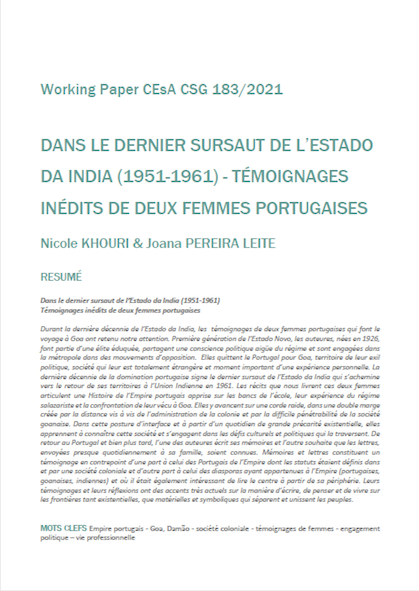
Working Paper 183/2021: Dans le Dernier Sursaut de l’Estado da Índia (1951-1961): Témoignages inédits de deux femmes portugaises
Abstract:
During the last decade of Estado da Índia, the testimonies of two Portuguese women who embark on a trip to Goa have caught our attention, getting us to write Dans le dernier sursaut de l’Estado da Índia (1951-1961) : témoignages inédits de deux femmes portugaises. Born in 1926 and part of the first generation of Estado Novo, the authors belong to an educated elite and share an acute political awareness of the regime, choosing even to engage in the metropolis opposition movements. They left Portugal for Goa, the territory of their political exile, a society totally alien to them and an important moment of personal experience. The last decade of the Portuguese domination sign the last burst of Estado da Índia which is moving towards the return of its territories to the Indian Union in 1961. The stories left by these two women articulate a history of the Portuguese empire, learned on school benches, portraying an experience of the Salazarist regime and the confrontation of the authors’ experience in Goa. There they make their way on a tightrope, created both by the distance to the colonial administration and by the difficult penetrability of Goan society. In this interface and stemming from an everyday of existential precariousness, they get to know this society and engage in the cultural and political challenges that cross it. Back in Portugal and later on, one of the authors write her memories and the other wish for the exposure of the letters, that she daily written to her family . The memoirs and letters constitute a counterpoint testimony, on the one hand to that of the Portuguese of the Empire (whose statuses and belonging were defined in a colonial society) and, on the other, to that of the diasporas belonging to the Empire (Portuguese, Goans , Indians) by where it is also interesting to read the center from its periphery. Their testimonies and their reflections have very current accents on the way of writing, of thinking and living on existential, material, and symbolic borders that both separate and unite people.
Quotation:
Khouri, Nicole e Joana Pereira Leite (2021). “Dans le dernier sursaut de l’Estado da Índia (1951-1961) : témoignages inédits de deux femmes portugaises”. Instituto Superior de Economia e Gestão – CEsA/ CSG –Documentos de Trabalho nº 183/2021.
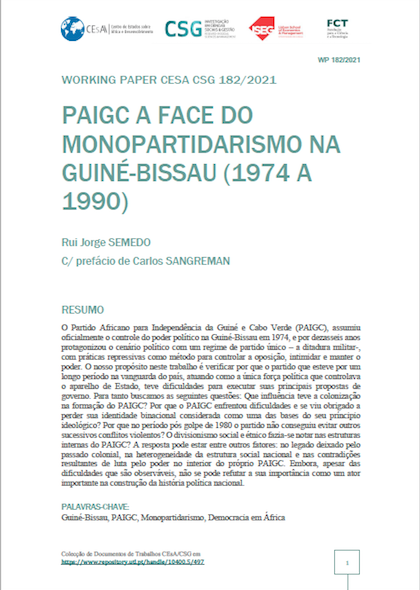
Working Paper 182/2021: PAIGC a Face do Monopartidarismo na Guiné-Bissau (1974 a 1990)
Abstract:
The African Party for Independence of Guinea and Cape Verde (PAIGC) officially took control of political power in Guinea-Bissau in 1974, and for sixteen years has starred in the political scene with a single-party regime – a military dictatorship–with repressive practices as a method to control the opposition, intimidate and maintain power. Our purpose in PAIGC a face do monopartidarismo na Guiné-Bissau (1974 a 1990) is to verify why the party that was for a long time at the forefront of the country, acting as the only political force that controlled the state apparatus, had difficulty executing its main government proposals. For this we seek the following questions: What influence did colonization have on the formation of the PAIGC? Why did the PAIGC face difficulties and were forced to lose its binational identity considered as one of the bases of its ideological beginning? Why in the post-coup period of 1980 could the party not prevent other successive violent conflicts? Was social and ethnic divisionism noted in the internal structures of the PAIGC? The answer may be among other factors: in the legacy left by the colonial past, in the heterogeneity of the national social structure and in the contradictions resulting from the struggle for power within the PAIGC itself. Although, despite the difficulties that are observable, it cannot be refuted its importance as an important player in the construction of national political history.
Quotation:
Semedo, Rui Jorge (2021). “PAIGC a face do monopartidarismo na Guiné-Bissau (1974 a 1990)”. Instituto Superior de Economia e Gestão – CEsA/CSG – Documentos de Trabalho nº 182/2021.
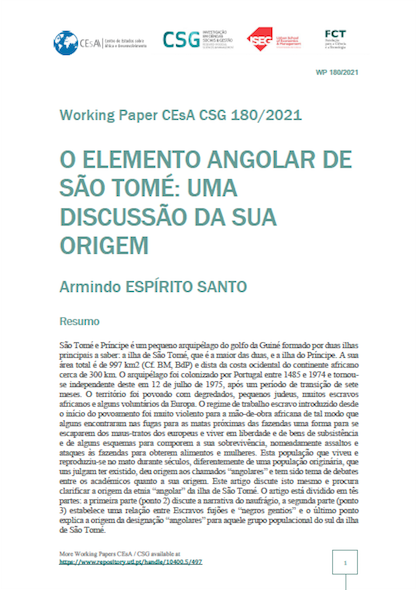
Working Paper 180/2021: O Elemento Angolar de São Tomé: Uma discussão da sua origem
Abstract:
São Tomé and Príncipe is a small archipelago in the Gulf of Guinea formed by two main islands, namely: the island of São Tomé, which is the larger of the two, and the island of Príncipe. Its total area is 997 km2 (Cf. BM, BdP) and is approximately 300 km from the west coast of the African continent. The archipelago was colonized by Portugal between 1485 and 1974 and became independent on July 12, 1975, after a seven-month transition period. The territory was populated with exiles, small Jews, many African slaves and some volunteers from Europe. The slave labor regime introduced since the beginning of the settlement was very violent for the African labor in such a way that some found in the escapes to the forests close to the farms a way to escape the mistreatment of the Europeans and live in freedom and subsistence goods and some schemes to compose their survival, namely assaults and attacks on farms to obtain food and women. This population that lived and reproduced in the bush for centuries, unlike an original population, which some believe to have existed, gave rise to the so-called “Angolas” and has been the subject of debates among academics as to its origin. This article discusses this and seeks to clarify the origin of the “Angolar” ethnic group on the island of São Tomé. O Elemento Angolar de São Tomé: Uma discussão da sua origem is divided into three parts: the first part (point 2) discusses the narrative of the shipwreck, the second part (point 3) establishes a relationship between fugitive slaves and “Black Gentiles” and the last point explains the origin of the designation “Angolas ” for that population group in the south of the island of São Tomé.
Quotation:
Santo, Armindo Espírito (2021). “O elemento angolar de São Tomé: uma discussão da sua origem”. Instituto Superior de Economia e Gestão – CEsA/ CSG – Documentos de Trabalho nº 180/2021.
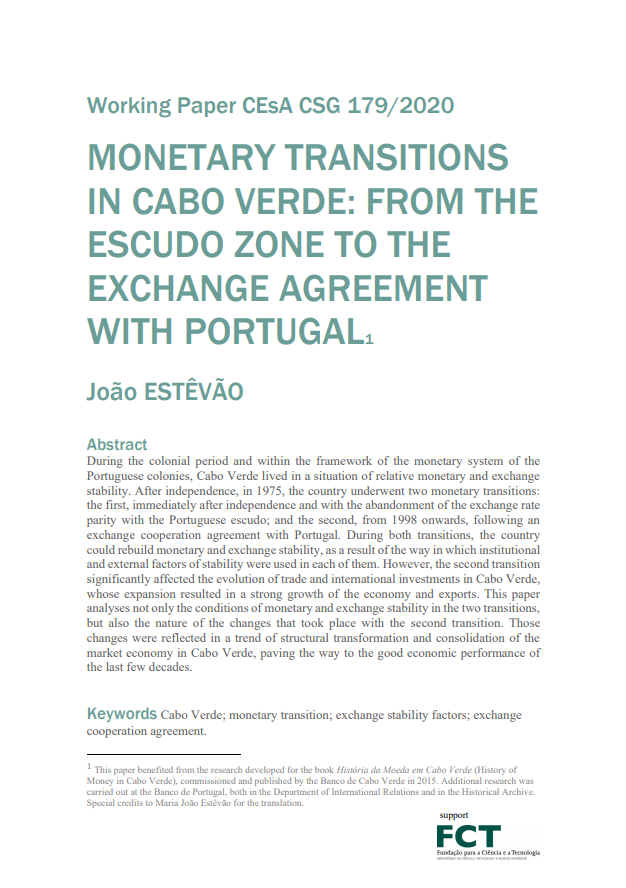
Working Paper 179/2020: Monetary Transitions in Cabo Verde: From the escudo zone to the exchange agreement with Portugal
Abstract:
Monetary Transitions in Cabo Verde: From the escudo zone to the exchange agreement with Portugal studies how, during the colonial period and within the framework of the monetary system of the Portuguese colonies, Cape Verde lived in a situation of relative monetary and exchange rate stability. After independence in 1975, the country underwent two monetary transitions: the first, immediately after independence and with the abandonment of parity with the Portuguese escudo; and the second, from 1998 onwards, following an exchange rate cooperation agreement with Portugal. During both transitions, the country was able to rebuild monetary and exchange rate stability, depending on how institutional and external stability factors were used in each of them. However, the second transition significantly affected the evolution of international trade and investment in Cape Verde, whose expansion resulted in strong growth in the economy and exports. This article analyses not only the conditions of monetary and exchange rate stability in the two transitions, but also the nature of the changes that occurred with the second transition. These changes translated into a trend of structural transformation and consolidation of the market economy in Cape Verde, paving the way for the good economic performance of recent decades.
Quotation:
Estêvão, João (2020). “Monetary transitions in Cabo Verde : from the escudo zone to the exchange agreement with Portugal”. Instituto Superior de Economia e Gestão – CEsA/ CSG – Documentos de Trabalho nº 179/2020.
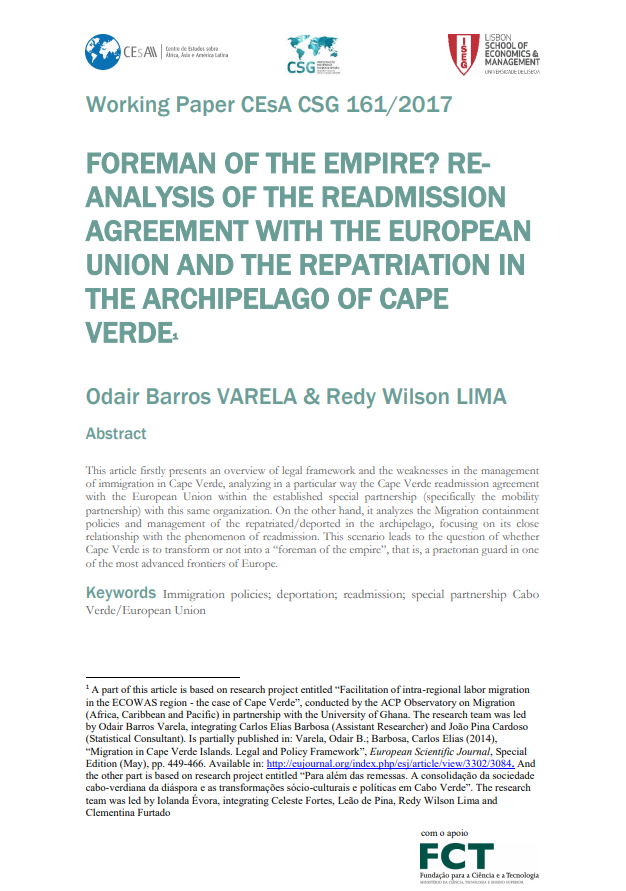
Working Paper 161/2017: Foreman of the Empire? Re-analysis of the readmission agreement with the European Union and the repatriation in the archipelago of Cape Verde
Abstract:
This article firstly presents an overview of legal framework and the weaknesses in the management of immigration in Cape Verde, analyzing in a particular way the Cape Verde readmission agreement with the European Union within the established special partnership (specifically the mobility partnership) with this same organization. On the other hand, it analyzes the Migration containment policies and management of the repatriated/deported in the archipelago, focusing on its close relationship with the phenomenon of readmission. This scenario leads to the question of whether Cape Verde is to transform or not into a “foreman of the empire”, that is, a praetorian guard in one of the most advanced frontiers of Europe. Trying to understand the complexity of migration to Cape Verde Island, one should also highlight the historical importance of links on the mobility of people, which played a key role in disseminating information and contacts between the pre-colonial societies. It should also refer to the implications of European colonial process in migration dynamics in the African continent, with the delineation of borders, through the recruitment of work force, or by using strategies for planning political and administrative control of the populations.
Quotation:
Varela, Odair Barros e Redy Wilson Lima (2017). “Foreman of the Empire? Re-analysis of the readmission agreement with the European Union and the repatriation in the archipelago of Cape Verde”. Instituto Superior de Economia e Gestão – CEsA/CSG – Documentos de Trabalho nº 161/2017.





